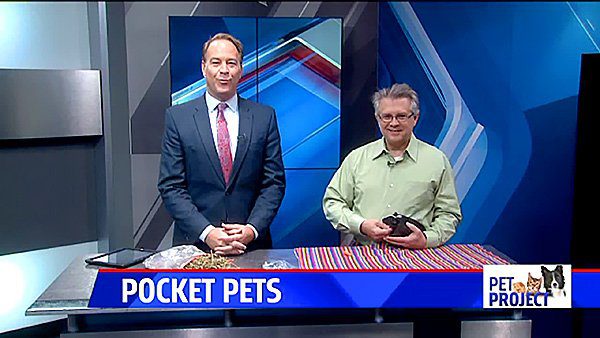James R. Speiser, DVM, DABVP, CCRT
November 8, 2017
Everyone loves small pets – guinea pigs, hamsters, ferrets, sugar gliders (if you’re into the more exotic pocket pets), but other than their size, what’s different about these pets that you need to know about? Today we’ll focus the topic to guinea pigs, but your veterinarian should be able to help with any questions you may have about other pocket pets. Housing the pet, nutrition and addressing specific issues that can arise with them are of key importance to ensuring that you and your new pet have a happy experience together.
Housing
Guinea pigs need a lot of space, about a 7 1/2 foot enclosure (30″ x 36″) so that they can get enough exercise. The cage needs to have a solid bottom – not a wire bottom and it should be at least 10″ high and escape proof. The next consideration to make is bedding, cedar chips or other types of wood chips are not good for guinea pigs, they thrive on pellet or paper products. Also, hiding helps makes guinea pigs feel secure, so including a box in their home is a good idea. Picking the right location for their home is important too, avoid direct sunlight, or cool drafty spaces like attics or garages in the wintertime.
Nutrition
Unlimited amounts of Timothy Hay is the preferred food you should be feeding your guinea pig. Unlike dogs and cats that should be fed a couple of times a day, guinea pigs graze all day long, so make sure there’s always food available to them. Additionally, you should feed them pelleted guinea pig food as a supplement to ensure that they’re getting all of the nutrients that they need. They’re also prone to scurvy, so adding a vitamin C supplement to their water is a good idea.
Health Concerns
The problems that guinea pigs have are primarily respiratory diseases, but if they’re not on a proper diet their teeth can overgrow and may need to be trimmed up and improper bedding can cause dermatitis (irritation of the skin that can cause it to become red, swollen, and sore and sometimes have small blisters). Just like dogs and cats, they can get fleas, lice and mites. Lastly, they can also grow tumors, so it’s a good idea to take them out and pet them regularly to feel for lumps and bumps. If you do feel something, take them to your veterinarian for help.
Guinea pigs can make wonderful pets and with the right housing, nutrition and proper veterinary care can live long healthy lives!

